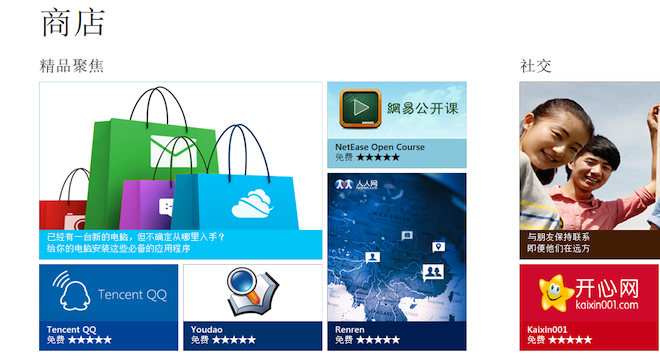Updated, 9:48 am ET, Friday, December 9
Microsoft attempted to woo developers and wow the tech press this week by offering a fairly extensive preview of, as well as a contest for, its forthcoming Windows Store, an online applications hub for Windows 8 desktop computers and mobile devices. But it’s not going over so well abroad.
The store is supposed to launch in February 2012, alongside the Windows 8 operating system, with apps starting at the price of $1.49 (as opposed to the most standard $0.99 price in the Apple App Store and Android Market), the Verge reported.
Microsoft also announced it is holding a contest for developers to determine the first eight (get it?) apps that will appear in the store.
Microsoft showed off a number of features of the store in a preview blog post and a live demonstration in San Francisco on Tuesday, boasting of the Windows Store’s simple and user-friendly navigation, built-in web search results for apps and automatic app download buttons that can be plopped on company websites, among other features.
Most importantly for developers and businesses, Windows championed the store’s 20 percent cut of app profits for apps that receive over $25,000 in revenue, compared to Google’s and Apple’s flat 30 percent take in their respective app stores.
“When we set out to build the Windows Store, we wanted to do the best job of connecting people to as many great apps as possible,” wrote Ted Dworkin, Microsoft’s partner program manager for the new mobile app marketplace in the inaugural blog post..
But while many initial reviews have praised the first look at the store, commenters, many of them budding developers, have been more critical, specifically over Microsoft’s current geographical restrictions on the store.
Despite Dworkin’s post saying that the “Windows Store is an opportunity to reach customers with free and paid apps in 231 markets worldwide,” including China, Microsoft has restricted initial app submission to 27 countries.
The contest for the first eight apps is even more restrictive: Only submissions from the “50 United States and District of Columbia, France, Germany, Japan, or India,” will be accepted, according to Microsoft’s terms.
To this, commentators have not taken kindly:
“Frustrating to see that Estonian developers are not welcome, yet again,” wrote commenter Strom, “Google doesn’t want us either. Apple however fully supports us. I originally wanted to develop apps for win8, but now I have no choice but to go with Apple.”
“If France and Germany can enter why cant people from the UK enter?,” asked Amy Gx.
“My dreams to sell Metro apps ended because Microsoft has incompetent human beings running its business,” wrote another user identified plainly as “someone pissed off,” continuing: “I’m from a country not listed…so the next Windows Store doesn’t allow me to register as a developer…Curiously, the country which I’m living and doesn’t allow me to register as developer, it can buy apps… As I said: Microsoft has incompetent persons.”
Of course, its prudent to mention that when Apple launched its App Store in 2008, it was only available in 62 countries, although Apple accepted (and still accepts) app submissions from developers in all countries where iTunes is available. Apple expanded its App Store to 33 more countries in the summer of 2011, bringing the total number up to 130 countries, still far less than what Microsoft is promising from the initial rollout of the Windows Store.
Google, too, initially limited its Android Market upon its launch in October 2008 — offering developers the options to only peddle free apps before bringing paid app support to the US and UK in February 2009. Google has since expanded its paid app developer pool to just 27 countries.
So relatively speaking, aspiring Windows Store developers have little basis to be complaining.
That said, over two-thirds of Microsoft’s revenue comes from international sales and the company remains the global leader in software sales, so the bar may be set a bit higher when it comes to international accessibility of new products.
Plus, there’s no denying Microsoft is playing catch-up when it comes to the app store game, now a significant chunk of business for Apple and Google. In fact, Google recently celebrated its 10 billionth download in the Android Market and is offering apps discounted to 10 cents each as a “thank you” present to Android customers.
In order to sway developers to make apps for the Windows 8 platform, let alone consumers to buy them, Microsoft is going to have to offer some pretty compelling new innovations and/or accessibility. While the Windows Store appears to offer the former, it may have stumbled out of the gate on the latter.
We’ve contacted Microsoft to ask how it is responding to the complaints of the Windows Store’s reach and will update when we hear back.
Late update: A Microsoft PR representative emailed TPM with the following statement regarding the complaints:
“Windows is in a pre-release state. We’re working to expand international reach at each milestone in the development process. Developer Preview was available in English only. Beta will be available in more languages.
Similarly, the Store will start with the First Apps contest accepting submissions from a small set of countries to ensure the service runs properly before the Store is deployed broadly.
The Store will support submissions from 27 countries when Windows 8 becomes generally available, and we are working hard to expand the list beyond 27.”
Say what you will about Microsoft, they do at least want to appear responsive to developer feedback. We’ll track the development of the Windows Store and update when we receive more information.









